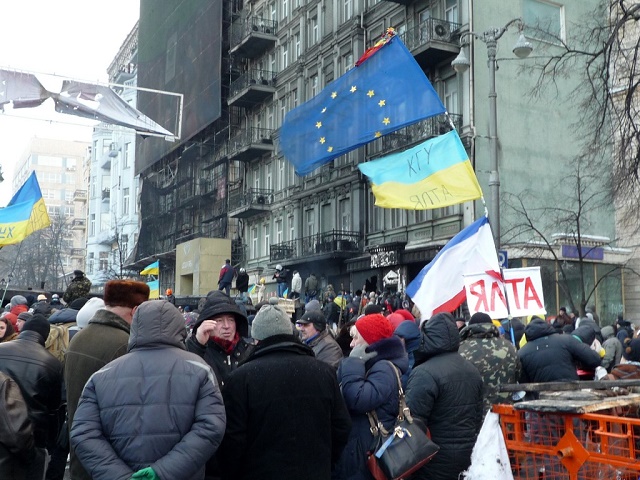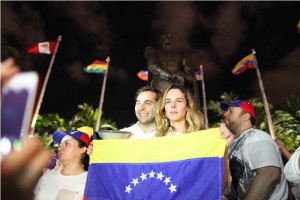From Ukraine to Venezuela, the West is turning popular revolutions into pretexts for intervention Comment
Ideas, New in Ceasefire - Posted on Thursday, March 13, 2014 15:28 - 6 Comments
By Tanzil Chowdhury and George Waterhouse

It used to be that the word ‘revolution’ was a term reserved by the left for describing a gigantic surge of energy, the élan vital of the disenfranchised. It was the rising up, the rebellion, the emancipation of the working-class proletariat. The term maintained an ethereal status, used only sparingly to reflect the candour and exceptionalism of the event. There are protests, there are demonstrations, and then there are seismic waves, fundamental changes, the shifting of tectonic plates that – to use the Latin definition of the word – turn around society. These were revolutions; the apotheosis of human dynamism, a critical juncture in the course of human history; the dismantling of the Tsarist or Pahlavi autocracy or the overthrow of the Batista government in Cuba. They produce a chaos that straddles the line between euphoria and menace, unravelling and revealing the contours of a collective human soul. Revolutions are cloudy; partially hiding an uncertain but optimistic future filled with love, creativity and hope.
The word ‘revolution’, however, seems to have shifted its social meaning; become diluted and its essence reshaped, snatched away from the hands of the majority and sold to the highest bidder. The word no longer commands the same diligence it once did. Instead, “revolutions” are today more likely to be invoked as green lights for foreign meddling and intervention, the new causus belli.
Indeed, western governments are clocking on: labelling any unrest or rebellion as a revolution (and, by extension, progressive), helps capture hearts and minds in much the same was as ‘bringing freedom and democracy’, ‘humanitarian intervention’ or – that antiquated phrase from the imperialist handbook – ‘civilising the barbarians’ has done over the past years and decades.
This piece does not attempt to define a revolution as a positivist or normative term. Rather, it follows a – perhaps not new but increasingly frequent – discourse in which the bastardisation of the word, and similar terms, has begun to provide firm ground for intervention.
In using the revolution-vernacular, or other similar heightened language, Western states hope to evoke ideas of freedom and democracy in support of the promotion of a regime change agenda based on imperial interests. Coupled with a subservient global media and a strategy based on selective reporting, the plan can be executed.
 The wave of anti-communist uprisings in Eastern Europe in the late 1980s and early 90s provides an example where the revolutionary pretext validated rampant privatisation and neoliberal policies (Ukraine’s economy, for example, suffered huge damage following the dissolution of socialism) and instigated outside support, both rhetorical and material, in the guise of McCarthyite anti-Sovietism.
The wave of anti-communist uprisings in Eastern Europe in the late 1980s and early 90s provides an example where the revolutionary pretext validated rampant privatisation and neoliberal policies (Ukraine’s economy, for example, suffered huge damage following the dissolution of socialism) and instigated outside support, both rhetorical and material, in the guise of McCarthyite anti-Sovietism.
Naturally, a revolutionary pretext to authorise intervention demands selectivity in the reporting; when a protest is brutally suppressed in Bahrain or Saudi Arabia, the Western media and capitals are generally silent, yet other, perhaps smaller (not to detract from legitimate grievances that protesters have,) instances will receive saturation coverage. The latest upheavals in Ukraine and Venezuela provide examples in which covert exploitation, support and coordination of domestic disturbances veer alarmingly toward outside military intervention. Violence committed by the opposition in both cases have failed to register on the media radar and, as such, is implicitly encouraged. Such acts, under the auspices of outside forces, are intended to provoke the government to react and, consequently, present legitimate justification for regime change. Significantly, the discourse often used to justify these interventionist exploits is a ‘revolutionary’ one.
The conflict in Ukraine highlights a split in the country’s corrupt gangster-oligarchy, but it also draws on decades of historical and ideological division. The North and West regions are generally viewed as more aligned with the West, while the South and East are more closely associated, linguistically and economically, with Russia. Both sections of the oligarchy across this divide, however, are equally ruthless and, indeed, have blood on their hands.
Some of the leaders of the 2004 Orange Revolution that drew the country closer to Europe have been imprisoned. In many cities in Western Ukraine, there have been attempts to ban the Communist Party since Yanukovych’s eviction from power on Feb 22. To complicate the situation, in the western region, a large and fiercely anti-communist neo-Nazi movement that celebrates Ukrainian SS volunteers has been denouncing a ‘Jewish-Russian mafia’ conspiracy. For many, the desire to form greater ties with Europe stems chiefly out of hatred for Russia. While minor progressive pockets exist within the opposition, fascists command substantial power and, indeed, support from abroad.
In effect, anti-communist repression and the celebration of fascist collaborators seem perfectly compatible with entering into bilateral agreements with the EU, an organisation that apparently prides itself on its liberal democratic vision, with equality for all its citizens. (Incidentally, existent ties with Europe have already impacted negatively on much of the industry and agriculture of the Ukraine, which has tended to be more reliant on Russian markets).
The Western media has highlighted the Svoboda party, one of the largest groups involved in the anti-Yanukovych protests, as the moderate contingent of the movement. This is in spite of the fact that Svoboda is part of the Alliance of European National Movements, whose membership includes the BNP and the Hungarian fascist Jobbik party. US presidential candidate John McCain has publicly met and endorsed Oleh Tyahnybok, a leading Svoboda figure who claims that a “Moscow-Jewish mafia” rule Ukraine. Apparently, the bottom line for both the EU and the US is to exploit any divisions that have the potential of undermining Russian influence in the region, conveniently portraying the rift as pitting a heroic pro-Western populace against a tyrannical pro-Russian government.
In Venezuela, US-backed coups against a democratically-elected government have become a modus operandi that locals ought to expect. The formula involves the privately-owned mass media blindly repeating the smears from Washington that an oppressive communist-government is massacring its own populace.
 During the Chavez era, elite-owned private media routinely manipulated video clips to make it appear that government troops were shooting at unarmed civilians. These images were beamed across the world before it later emerged that snipers were firing on government supporters who then tried to shoot back. This type of media selectivity has been in evidence again in recent protests in Caracas, painting them as popular and heterogeneous whilst ignoring the mass pro-government protests coming out in support of the Maduro government.
During the Chavez era, elite-owned private media routinely manipulated video clips to make it appear that government troops were shooting at unarmed civilians. These images were beamed across the world before it later emerged that snipers were firing on government supporters who then tried to shoot back. This type of media selectivity has been in evidence again in recent protests in Caracas, painting them as popular and heterogeneous whilst ignoring the mass pro-government protests coming out in support of the Maduro government.
In both Ukraine and Venezuela, dressing civil unrest as a popular revolution or uprising seems to be the pretext of choice for intervention. Needless to say, one should not ignore or deny the real and legitimate popular grievances that many have in such social upheavals. Rather, the aim is to highlight the pivotal role played by external forces that seek to exploit such popular energies.
The tactic of creating a bogey man to justify Western intervention seems to have been refined and reconstituted. Whereas Europe destroyed countries across the globe during their imperial conquests – and subsequently offered to rebuild these same countries in exchange for money and resources – this new era of neo-colonialism no longer warrants the need to send in armies (except for ‘Shock & Awe’ imperatives, as in Iraq). To tap into markets hostile to American and European economic expansionism requires something more than the old narratives of ‘democratisation’ and ‘humanitarianism’. As the mainstream narrative has it, the West is now concerned with ‘revolution’ and appears to have finally sided with the oppressed. Again, this is not to denigrate revolutions and legitimate popular concerns, which are often real and pressing. Rather, one must condemn the West’s attempt to deploy the romantic appeal of revolutions – which can unite people from across the political spectrum – as merely a new conduit for pursuing a rather old agenda.
6 Comments
Charles D
[…] via From Ukraine to Venezuela, the West is turning popular revolutions into pretexts for intervention | …. […]
An A to Z of Theory | Alain Badiou: Ontology and Structuralism | ΕΝΙΑΙΟ ΜΕΤΩΠΟ ΠΑΙΔΕΙΑΣ
[…] Comment | From Ukraine to Venezuela, the West is turning popular revolutions into pretexts for inter… Thursday, March 13, 2014 15:28 – 2 Comments […]
I believe the situation in the world will be more and more controlled by media, social media. I know latinoamerica very well, I know europe, I am european, well the power is now to control menings, opinion. It is not more an idea of “communism” and “capitalism” even if this won, in such way. The word revolution is sometimes magic, like the idea to change, an hope of freedom… but I believe a change is really not easy….
I mean, the word “revolution” is just used…in a bad way. A strategy. The words lose the real meaning.
Jim Monaghan
In the interest of balance it should be pointed out that Jobbik and the BNP, cited above support Russia in Crimea and the East of Ukraine. Some other vewpoints http://internationalviewpoint.npa2009.org/spip.php?article3395 and http://internationalviewpoint.npa2009.org/spip.php?article3440 and http://internationalviewpoint.npa2009.org/spip.php?page=recherche&recherche=Ukraine



Why do we have “freedom fighters and champions of Democracy” in the Ukraine and Venezuela, but a rabble of troublemakers in Thailand? The hypocrisy of the Western governments and media is obvious to anyone.